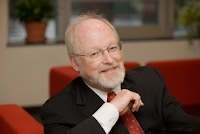Special Plenary:
Donna M. Mertens (Professor Emeritus, Gallaudet University)
Title: Strengthening the Bond between Ethics and Research through Transformative Mixed Methods Approaches
Summary:
Researchers can argue about what characterizes a researcher’s ethical role from many different perspectives. For researchers who are philosophically situated in the transformative paradigm, the ethical responsibility extends to seeking ways to design research that directly addresses issues of human rights and social justice and supports a pathway to action to address the problems. This entails the inclusion of mixed methods approaches in order to reveal the diversity of culturally based beliefs, values, and patterns of behavior that are relevant within the context of the research. Ethical research needs to recognize the strengths of all members of the communities and integrate the strengths of all into the conduct and use of the research findings. It also means being aware of power differences in communities that either support or impede social justice and includes strategies to address power differentials in the research design. Mixed methods studies will be used to illustrate how research can be designed with a focus on reciprocity in the form of supporting positive social change, even while recognizing that many variables that are outside of their control impact the actual occurrence of change. Thus, the transformative ethical stance calls for actionable research, rather than merely describing problems and leaving people no better off than before.

Dr. Donna M. Mertens is Professor Emeritus at Gallaudet University with a specialization in research and evaluation methodologies designed to support social transformation. She has authored, co-authored, or edited over 15 books relate to research and evaluation methods and human rights, most recently Research and Evaluation in Education and Psychology: Integrating Diversity with Quantitative, Qualitative, and Mixed Methods, Indigenous Pathways into Social Research, Program Evaluation Theory and Practice, and Transformative Research and Evaluation. Her scholarly work focuses on the intersection of research and evaluation with social justice and human rights and is situated within the philosophical assumptions of the transformative paradigm. She taught MA and PhD hearing and deaf students in education, psychology, social work, administration, and international development for 32 years. She has conducted professional development related to transformative mixed methods in many contexts, e.g., the Australasian Evaluation Society in Australia and New Zealand; the African Evaluation Association in South Africa, Niger, and Ghana; the Grupo de Institutos, Fundações e Empresas in Brazil; the World Bank and the Community of Evaluators in India and Nepal; the Sri Lankan Evaluation Association in Sri Lanka; UN Women and Evaluation Partners in Kazakhstan and Kyrgyzstan. Mertens also served as the Editor for the Journal of Mixed Methods Research 2010-2014.
Summary:
At the turn of the 21st century, the number of published mixed methods research works was still relatively small, and, thus, mixed methods research was in its “adolescence” (Teddlie & Tashakkori, 2003, p. 3). However, since the publication of the first edition of the handbook of mixed methods research in 2003 in general, and the inception in 2007 of two journals devoted exclusively (i.e., Journal of Mixed Methods Research [JMMR]) or predominantly (International Journal of Multiple Research Approaches [IJMRA]) to mixed methods research in particular, the number of published mixed methods research works has increased exponentially. Thus, mixed methods research has now entered what I refer to as the emerging adulthood stage (cf. Jeffrey Arnett, 2000)—a period characterized by identify exploration wherein mixed methods researchers adopt a roleless role that involves an array of activities and are not limited by the kind of restrictions that underlie monomethod research (i.e., unconstrained by role requirements). Although still young, mixed methods research has made very important advancements that have had a positive impact not only for the field of mixed methods research but also for the fields of qualitative research and quantitative research. Thus, in this plenary talk, first, via conducting an extensive analysis of all articles published in the 10.5 years of JMMR, I will outline the trends in both empirical and non-empirical (e.g., methodological, theoretical, conceptual) articles. With respect to the genre of empirical research articles published in JMMR over this period, I will delineate the frequency of topics studied, the type of research design used, the type of data collected, and the data analysis approaches, methods, and techniques used for each phase/component. Also, I will discuss the level of integration involved in these studies, as well as the point(s) of interface. With regard to the genre of non-empirical research articles published in JMMR over this period, I will provide a typology of the innovative frameworks introduced by these authors. Further, I will discuss the degree of collaboration involved in these articles as a whole and as a function of article genre. Also, I will discuss the role that technology has played in these JMMR articles. Finally, based on these series of findings, I will present a summary of the advances made in mixed methods research over the last decade and make some predictions as to potential future advances for the mixed methods research community that might help propel mixed methods research into middle adulthood.

Anthony J. Onwuegbuzie is professor in the Department of Educational Leadership at Sam Houston State University, where he teaches doctoral-level courses in qualitative, quantitative, and mixed research. Further, he is Distinguished Visiting Professor at the University of Johannesburg. His research areas primarily involve social and behavioral science topics, including disadvantaged and under-served populations such as minorities, children living in war zones, students with special needs, and juvenile delinquents. Additionally, he writes extensively on an array of qualitative, quantitative, and mixed methodological topics.
With a current h-index of 74, Professor Onwuegbuzie has secured the publication of more than 400 works, including more than 300 journal articles, 50 book chapters, and 5 books. Additionally, he has delivered more than 900 presentations and 200 methodological workshops worldwide and more than 50 keynote addresses across six continents. He has received numerous outstanding paper awards. Professor Onwuegbuzie is former editor of Educational Researcher (ER), being part of the Editor team (2006-2010) that secured a first impact factor of 3.774. Currently, he is editor-in-chief of the mixed methods journal, International Journal of Multiple Research Approaches, and a co-editor of Research in the Schools. Further, Professor Onwuegbuzie has received national and international recognition for his teaching. Also, over the last decade, he has secured more than 30 grant awards.
Plenary 2:
John W. Creswell (Founder of MMRIA)
Title: Embedding Core Designs into Complex Designs, Methodologies, and Theories

John W. Creswell, Ph.D. is a Professor of Family Medicine and Co-Director, Michigan Mixed Methods Research and Scholarship Program at the University of Michigan. He has authored numerous articles and 27 books on mixed methods research, qualitative research and research design. While at the University of Nebraska-Lincoln, he held the Clifton Endowed Professor Chair, served as director of a mixed methods research office, founded the SAGE journal, the Journal of Mixed Methods Research, and was an Adjunct Professor of Family Medicine at the University of Michigan and a consultant to the Veterans Administration health services research center. He was a Senior Fulbright Scholar to South Africa in 2008 and to Thailand in 2012. In 2011 co-led a national working group on mixed methods practices at the National Institute of Health, served as a Visiting Professor at Harvard’s School of Public Health, and received an honorary doctorate from the University of Pretoria, South Africa. In 2014 he was the President of the Mixed Methods International Research Association. In 2015 he joined the staff of Family Medicine at the University of Michigan.